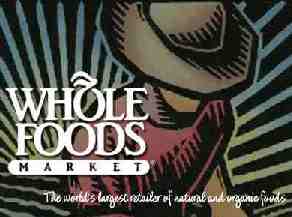 How does Starbucks sell aspiration, you ask? In several ways, not least of which is through its leading product, the cup of joe. (Incidentally, how did coffee come to get the name "Joe"? Why not Susan, Arthur or Ringo?) Perception at the consumer level is that by purchasing a (recycled) cup with the siren on the side, we are participating directly with a way of life. This perception is hardly accidental. It has been cultivated over a period of years, as a result of guiding principles within the company geared toward better living and bigger profits. While these two ideas might seem mutually exclusive at first glance, Starbucks as well as other successful companies in the Pacific Northwest are showing the contrary to be true.
How does Starbucks sell aspiration, you ask? In several ways, not least of which is through its leading product, the cup of joe. (Incidentally, how did coffee come to get the name "Joe"? Why not Susan, Arthur or Ringo?) Perception at the consumer level is that by purchasing a (recycled) cup with the siren on the side, we are participating directly with a way of life. This perception is hardly accidental. It has been cultivated over a period of years, as a result of guiding principles within the company geared toward better living and bigger profits. While these two ideas might seem mutually exclusive at first glance, Starbucks as well as other successful companies in the Pacific Northwest are showing the contrary to be true.John P Mackey, chief executive at Whole Foods Market, calls this fusion values-driven capitalism. Last year in an article in Reason magazine, Mr Mackey stated that he believes in a form of capitalism "that more consciously works for the common good instead of depending solely on the 'invisible hand' to generate positive results for society." With over 180 stores and $5.7 billion in sales, his idea is successful. More people are buying the organic products he sells because it would seem they want superior products in health, taste and nutrition.
 "The appeal of Whole Foods is that it is a place where food is celebrated," says Bill Bishop, president of a food retail consultancy, "food is romanced, food is presented in a fashion that is in opposition to how it is sold in the vast majority of supermarkets." Arguably the same could be said of another west coast staple, Trader Joe's; both companies write their ticket on brick-and-mortar values, the grassy principles of people that root themselves in sustainability and humane treatment of fauna. By the same token, Starbucks participates in aspirational retailing also, insomuch as it promotes water conservation, fidelity to small farms and healthy living.
"The appeal of Whole Foods is that it is a place where food is celebrated," says Bill Bishop, president of a food retail consultancy, "food is romanced, food is presented in a fashion that is in opposition to how it is sold in the vast majority of supermarkets." Arguably the same could be said of another west coast staple, Trader Joe's; both companies write their ticket on brick-and-mortar values, the grassy principles of people that root themselves in sustainability and humane treatment of fauna. By the same token, Starbucks participates in aspirational retailing also, insomuch as it promotes water conservation, fidelity to small farms and healthy living.Starbucks imports the bulk of its beans from South American and African farms. Because it does not produce locally, the siren is often the target of vicious slander; not only this, but there is a perception as well that it should export sound values to the regions where it buys. To a growing extent, Starbucks is doing so. Can the same be said of Whole Foods? They import a great deal of produce from overseas. Asparagus, for example, is brought in from New Zealand. Yet the kiwi farms are hardly paradigms of sustainable agriculture, and clearly the produce, once it appears on a rack in the US, is not fresh.
Were Whole Foods customers to understand this disparity from what could be called "organic values", would they lose faith in the enterprise? Somehow I doubt it, but the question is valid. What if they knew Whole Foods is a wholly-owned subsidy of General Mills? My point is not to denigrate the company; rather I merely wish to draw a comparison with Starbucks. Both companies represent a pelagic shift in economic seas, one that aims, I think, toward positive growth. This kind of aspirational retail is quickly gaining cachet. John Heinbockel of Goldman Sachs calls Whole Foods "one of the best businesses in retail today."
At risk of stating the obvious, Starbucks is also described by Wall Street in such jubilant tones.
During the 2004 campaign season, there was a lot of talk about values and how important they are to voters when choosing who to elect. At the time I did not give this talk much credence, but it appears I should have. While the results of that season are less than ideal, we can yet depend on this manifest paradigm bringing about a good harvest. Here's hoping we continue to see the trend grow.
No comments:
Post a Comment